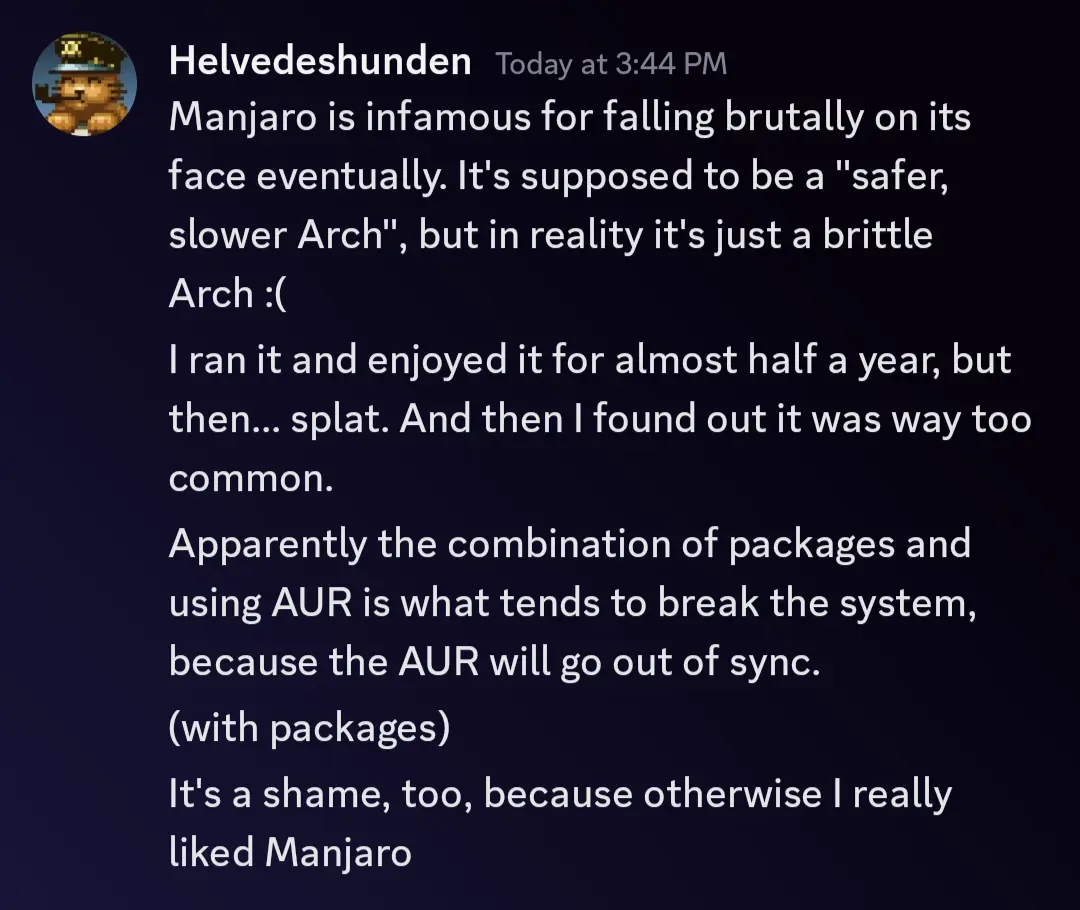249
you are viewing a single comment's thread
view the rest of the comments
view the rest of the comments
this post was submitted on 21 Dec 2023
249 points (94.3% liked)
Linux
48721 readers
956 users here now
From Wikipedia, the free encyclopedia
Linux is a family of open source Unix-like operating systems based on the Linux kernel, an operating system kernel first released on September 17, 1991 by Linus Torvalds. Linux is typically packaged in a Linux distribution (or distro for short).
Distributions include the Linux kernel and supporting system software and libraries, many of which are provided by the GNU Project. Many Linux distributions use the word "Linux" in their name, but the Free Software Foundation uses the name GNU/Linux to emphasize the importance of GNU software, causing some controversy.
Rules
- Posts must be relevant to operating systems running the Linux kernel. GNU/Linux or otherwise.
- No misinformation
- No NSFW content
- No hate speech, bigotry, etc
Related Communities
Community icon by Alpár-Etele Méder, licensed under CC BY 3.0
founded 5 years ago
MODERATORS

My brother had that OS. It worked fine until it got a bug that the computer froze when he enabled the wifi, and the only way to stop it was pressing the power button. I couldn't figure out the cause, and there was many unnecessary things coming with the OS, so I helped him to install Arch instead. Now, it works well and feels clean.
EDIT: based on the comments, the issue happened with arch too.
Odds are it would have come up on a regular Arch install too, and simply reinstalling is what fixed it.
EndeavourOS is essentially just a GUI installer for Arch with some defaults changed.
I was wondering this, too. I'm too new to Manjaro to have any opinion about its long-term stability, but it doesn't make intuitive sense to me that Manjaro would be less stable than a distro that is based solely on the AUR.
I wonder if Arch newbies choose Manjaro initially, improve their knowledge of Linux, then switch to Arch if their installation fails. After that, having reached Linux's final boss, they know that all further problems in Arch are just part of the experience.
Or is it maybe that Arch installations are often more minimalist than Manjaro and so are less likely to have conflicts? By way of example, and going from memory, the base EndevourOS install is around 900 packages, while the base Manjaro install is over 14,000 packages.
I really like my Manjaro installations, so as you can imagine, I'm hoping it isn't an inherently flawed distro.
I've been running Manjaro for about 6 years. I've only had self induced issues.
Arch is a better OS in that you have more control of exactly what it will do. But Manjaro also provides a great experience out of the box with all the major DEs. It really comes down to how much convenience are you willing to trade for control.
For what it's worth, I've only noticed the slower Manjaro repo helping me once when steam fonts broke on the arch repo. So I basically had a warning and was able to switch to the beta version of the steam client to avoid that issue. So the slower Manjaro repo is not a selling point IMO, but the DE tweaks and configurations are.
Looks like they've gotten better in the last year or so, but there's a pretty strong pattern of fuck-ups that have put a lot of the community off of Manjaro: https://manjarno.pages.dev/
If this was a recent occurrence, it may have been from the 6.6.5 kernel. There was a WiFi regression in that version that did exactly that, slowed the system to an absolute crawl. I got hit by it on my PC and ended up hosing my whole install (because I panicked and botched things up), but my laptop was fine. I finally got things reinstalled a couple days later when 6.6.6 was released, which fixed the regression anyway.
I get it but that sounds like a bit of a niche problem and I don't know if OP, as a beginner, would have much luck setting up Arch on their own without running into some weird issue of a similar caliber.
I also had issues with the wifi on EndevourOS just a few weeks ago. Ended up going back to Manjaro.
Isn't it just an installer, welcome app, theming, and maybe an Nvidia driver helper?
I don't think Endeavour really adds that much, but maybe my perception has been wrong this whole time 🤷
That's exactly what makes Endeavor a great option over Manjaro. You just end up with more-or-less normal Arch instead of the jank of Manjaro.
Oh, for sure. I was responding to the guy saying "I couldn’t figure out the cause, and there was many unnecessary things coming with the OS"
Doesn't seem like there's that much extra with Endeavour vs Arch.
Oh gotcha -- sorry, missed the context
No, you are right. EndeavourOS is about two-dozen packages on top of the Arch repos and AUR ( 80,000 packages ). Most of the additional packages are just nice-to-have utilities you can enjoy or avoid.
EOS ( EndeavourOS ) is more of an opinionated Arch installer than a stand-alone distribution. Other than theming, almost everything in a fresh EOS install comes from the Arch repos. Even the kernel is native Arch.
I happen to like the way EOS sets up the system, including that it installs yay by default which makes the AUR available right away.
You can disable the EOS repos in EndeavourOS if you want. It really is just Arch.
Since EndeavourOS uses the Arch packages and the Arch kernel, there is nothing in EndeavoyrOS that could impact WiFi that would not be the same in Maeve Arch.